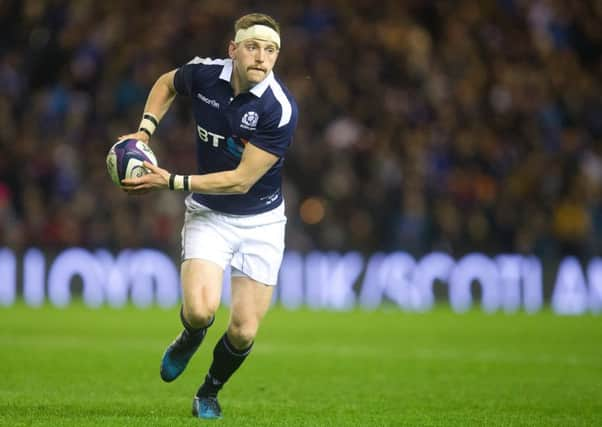Allan Massie: Finn Russell raises my hopes for Scotland


Of course there have been good moments in the intervening years, and players who became heroes to the next generation. But the fact is that we have been in the doldrums, regarded too often with condescending pity by southern journalists.
Could this be about to change? May the long hoped-for dawn break in 2017? It’s just possible. Here’s a straw in the wind. Last Monday a London newspaper published its European team of the week-end: seven of the selected XV came from Glasgow: Stuart Hogg, Tommy Seymour, Alex Dunbar, Finn Russell, Ali Price, Jonny Gray and Josh Strauss. Such newspaper selections are of course frivolous in that they can never be tested. Nevertheless they are not entirely insignificant; the straw is being blown on a prevailing wind. The message is that we really have some remarkably fine players here in Scotland.
Advertisement
Hide AdAdvertisement
Hide AdAs a TV summariser at Scotstoun, Austin Healey announced his membership of the Finn Russell Appreciation Society; and quite right too. Finn’s two matches against Racing 92 were remarkable, not only for his flair and invention and the way he ghosts through defences, but also for his command of the game. He is playing as well as his mentor Gregor Townsend did in the late 90s and John Rutherford in the middle 80s. International teams rarely do well – Scottish ones almost never – without a fly-half who asks questions which the opposition find difficulty in answering; and this is what Russell is doing now.
There are other substantial reasons for optimism. In his three years in charge Vern Cotter has given opportunities to a great many players, probably three full XVs worth. I reckon he now knows what, barring injuries, his best line-up is. So he may be able to field a settled side in the Six Nations, or as near to one as is possible nowadays. Professional clubs have to practise rotation, but you want to avoid having to do this over the weeks of the Six Nations tournament. With luck Cotter will have a more or less settled team, composed of players who now know what it is to win big matches – and what it takes to do so. I don’t think they will be overawed by anyone.
That’s the good news, the reason for thinking that at long last our winter may be over. Of course if you flip the coin, things look a bit different. We have improved and are still improving, but so – dammit – are our rivals. Everyone says every year that the first match of the tournament is vital; it puts you on the front foot if you win, on the back foot otherwise. We play Ireland first, and the way Ireland played in the autumn and the Irish provinces are playing now makes this a very tough assignment, even at Murrayfield. Irish rugby has never flown higher than it is flying today. They may well, at their best, be the best team in the Northern Hemisphere; certainly I don’t expect to see them lose in Dublin, even against Eddie Jones’s rampant England.
And there’s the rub. Ireland and England are both outstanding; this is the best England team since Clive Woodward’s World Cup winners in 2003. Then, with the astute and vastly experienced Guy Noves in charge, France seem to be rousing themselves from their long sleep. (Moreover – all credit to the French Federation – they have just announced that in future they will no longer pick foreigners qualified by a mere three years’ residency; henceforth a French passport will be required.) Then Italy, too, may be stirring; they beat South Africa, and, even though this autumn’s South African side was perhaps the weakest ever to have worn the famous dark green jersey, this suggested that, at least in Rome, Italy will be tough nuts in February and March. Wales had a dreary and disappointing November, nevertheless won three of their four matches, and are usually better in the Spring.
Consequently one must conclude that this looks like being the most competitive Six Nations ever. We may indeed have our strongest team since 1999 – and, like that one, it’s a team capable of scoring tries against anyone; but it’s going to face some very severe tests. An appetising prospect of course. Meanwhile we also have Glasgow’s European performances to delight in, and Edinburgh’s somewhat more helter-skelter progress in the Challenge Cup. Before these tournaments resume, we have the first leg of the Inter-City, a match which may allow connoisseurs of the unfairly-reviled set scrum to relish a battle royal between Alasdair Dickinson, happily fit again and raring for action, and young Fagerson.
Merry Christmas.